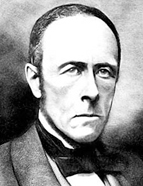

“I have no illusion” – he avowed in 1875 – “that it was useless to seek refuge here. My fate is to die tethered to an inkpot. I accept the inevitable.” (Cartas de Vale de Lobos [Letters from Vale de Lobo], I, 57).
There is perhaps too much pathos in the comparison between writing and the deprivation of freedom, but it must be acknowledged that Herculano never viewed his literary activity as pure and simple pleasure. This, among other possible reasons, was because it was no easy task to align the colliding demands imposed both on the scholar, whose discourse in relation to the past was strictly controlled by a critical analysis of historical material, and on the writer, whose imagination was not bound to comparable factual constraints. By the same token, the position of the historian, presumed to be impartial, who states that his main aim is to tell the truth about the past, contrasts with the situation of the polemicist, who is expressly partial and focused on the present, and who is given more freedom to steer away from the ideal of a disinterested search for the truth (Assis, “A. Herculano entre a imparcialidade e a parcialidade”, 319-322). One of Herculano’s major accomplishments was that he managed to play all of those (and other) roles with aplomb. Understanding how he was able to move between genres that interrelate so tensely is tantamount to understanding a pivotal feature of his intellectual biography.
Primary references: “Elogio histórico de Sebastião Xavier Botelho” [1841], in: Opúsculos, vol. V, orgs. Jorge Custódio & José Manuel Garcia, Lisboa, Presença, 1986, pp. 103-118; “Instrução pública” [1841], in: Opúsculos, vol. III, orgs. Jorge Custódio & José Manuel Garcia, Lisboa, Presença, 1984; “Cartas sobre a História de Portugal” [1842], in: O cidadão e o historiador – Antologia, vol. I, orgs. Vitorino de Magalhães Godinho & Eurico Gomes Dias, Lisboa, INCM, 2010, pp. 97-171; “D. Leonor de Almeida, Marquesa de Alorna” [1844], in: Opúsculos, vol. V, orgs. Jorge Custódio & José Manuel Garcia, Lisboa, Presença, 1986, pp. 121-125; “Apontamentos para a história dos bens da Coroa e dos foraes” [1843-1844], in: O cidadão e o historiador – Antologia, vol. I, orgs. Vitorino de Magalhães Godinho & Eurico Gomes Dias, Lisboa, INCM, 2010, pp. 176-241; História de Portugal. Desde o começo da monarquia até o fim do reinado de Afonso III, 4 tomos, Lisboa, Bertrand, 1980-1981 [1as eds. 1846-1853]; O monge de Cister, 2 tomos, Lisboa, Bertrand, 1977-1978 [1ª ed. 1848]; “Solemnia verba: ao Sr. A. L. Magessi Tavares” [1850], in: Opúsculos, tomo III, Lisboa, Bertrand, 1876, pp. 62-98; História da Origem e Estabelecimento da Inquisição em Portugal, 3 tomos, Lisboa, Bertrand, 1975-1976 [1as eds. 1854-1859]; “Do estado das classes servas na Península (desde o século VIII até o XII século)” [1858], in: Opúsculos, tomo III, Lisboa, Bertrand, 1876, pp. 235-332;
